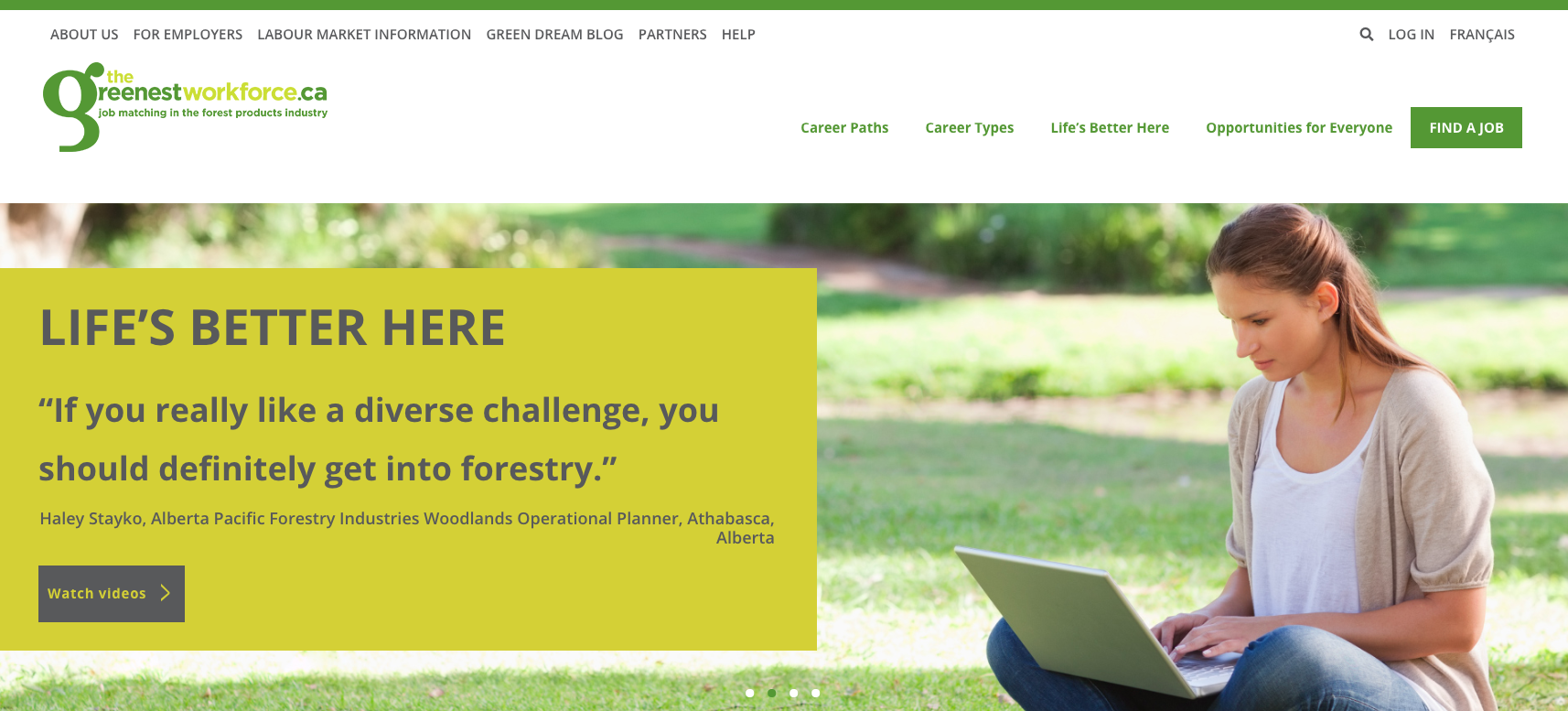
The search for Canada’s Greenest Workforce
November 3, 2019
By Ann Evans

Canada’s forest industry has come a long way from the iconic lumberjack. Today, men and women of all ages and from different backgrounds are powering the forest products sector with skills that run from biology to IT to heavy equipment operations. We are an industry that now is more diversified than ever, from white lab coats to orange safety vests.
This fall, and with the support of the federal government’s sectoral initiative program, Canada’s forest products sector will launch our new national job-matching tool. With The Greenest Workforce, we are working to build our talent pipeline to fill an array of good-paying jobs in engineering, skilled trades, mill and woodlands operations and administration.
In recent years, breakthrough innovations and transformations in the forest sector have unleashed its enormous potential as a global leader. This revolution offers significant economic opportunity and jobs for thousands of Canadians in hundreds of communities. At the same time, we are competitive leaders in renewable energy and sustainability, and manage our forests with care so future generations can enjoy them as forests forever.
This transformation of Canada’s forest products sector is not limited to the new technologies in our forests, at our mills, and the innovative products we are making – it is also reflected in the changing face of our workforce.
Throughout Canada’s history, the forest products industry has been one of the most significant contributors to employment. In recent years, the workforce has reached a level of 230,000 direct jobs across Canada. We call over 600 municipalities “home” and create family-supporting jobs in all regions of the country, including rural and remote communities, mid-sized cities and large urban centres, and over 400 Indigenous communities.
Our future depends on a skilled workforce. The sector needs of all types of workers such as millwrights, pipefitters, engineers, technologists, forest technicians, power engineers, truck drivers and management personnel.
Just as forestry is part of the Canadian story, our openness to a diverse and inclusive workforce also reflects the best parts of Canadian society. Like many other great forestry companies across Canada, my employer, Canadian Kraft Paper Industries, offers family-supporting jobs open to men and women, Indigenous peoples, millennials, new Canadians and older workers.
There is room for everyone in our sector. While we have three generations of the same family at work, we also have people who have seen their first snowfall, who are living in their first northern community, and who are proud of their first job.
Not only are we actively promoting work for graduates and new Canadians, we encourage training and skills development for people looking for a fresh start. As well, the forest products industry is one of the largest employers of Indigenous people in Canada and works with more than 1,400 Indigenous businesses. Building relationships and partnering with Indigenous communities will help to ensure that families, our industry and the Canadian economy thrive.
Only 17 per cent of workers in our sector are women. While that number is on the rise, we see a huge opportunity to promote careers in the forest sector as an option for both men and women who might not yet be thinking about us. Last fall, the federal government launched a national action plan to promote gender equity in the forest sector. This work will support our efforts to actively identify and address barriers and gaps that stand between us – and the women we want to welcome.
The new Canadian forest products industry needs sharp minds who care about the environment, who are looking for quality-of-life and access to the great outdoors, and who want to work in an industry that understands the value of a renewable natural resource.
Wages and benefits in the forest sector are among the highest and most competitive in the country. The forest sector employs a diverse range of professionals including foresters, mapping specialists, field technicians, hydrologists, wildlife scientists, harvesters, conservation scientists, loggers, senior executives, tree planters and other widely recognized professions.
Canada’s forest industry is becoming a world leader in clean technology. Canada has the best environmental reputation in the world. And, we’re generating good pay and benefits, a wide range of career paths, opportunities to learn on the job – all this plus the pleasures of living in tight-knit, affordable communities with nature at your back door.
To remain a critical contributor to future jobs and economic growth, especially in rural Canada, the forest industry needs new adventurers today to join The Greenest Workforce.
Ann Evans is chief financial and operating officer for Canadian Kraft Paper Industries and a member of the board of directors for Forest Products Association of Canada (FPAC).
Print this page